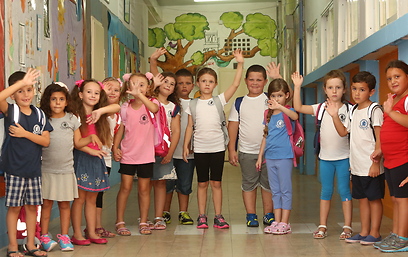
An investment in school books, not schools
Op-ed: Why, when everyone believes education is a priority, is Israel making its parents shell out more and more for superfluous textbooks?
1. In almost every poll conducted in Israel that asks "What is the most important issue?" or "Where should we invest more?" the answer is already known in advance. Education is the most common response. It is more important than the Iranian threat, the advance of the Islamic State, and even house prices.
Every party, especially if it is a new one, trying to sell us "a significant increase in the education budget." In other words, education is the priority. In practice, this is merely lip service, both by parents and politicians. It's easy to talk, it is much harder to act.
Data regarding state investment in education is somewhat confusing. According to a study by the Taub Center, the past decade has seen an increase of 15% in the education budget per pupil, from less than 17 thousand shekels in real terms in 2004, to some 20 thousand shekels in the last two years.

On a less happy note, parental expenditure on education has increased over the last five years from 22% to 29%. And according to the Taub Center researchers, part of the problem is a lack of transparency.
For example, if we trust in the education budget figures, there have been serious cuts in education in the ultra-Orthodox sector. But close examination of the actual expenditure reveals that not only were there no cuts, but rather there was actually an increase. Are they pulling the wool over our eyes? It could well be.
What is clear is that there is a slow but sure increase in ultra-Orthodox education, there is a steady increase in the parental participation, and there are gaps in achievement compared to the OECD countries. What a sorry start to the school year.
2. The issue of Israeli textbooks is no less scandalous. Israel requires each student to purchase dozens of textbooks and workbooks sometimes costing more than 1,000 shekels. This is an excessive expense, and to make matters worse, in many countries there is no such thing as paying for books.
While the parents of Israeli schoolchildren are forced to stand in interminable bookstore queues, France asks its schoolchildren to buy three books (three!) and the United States asks for one book. Everything else is provided in the classroom. I am talking about public education here, not private. Furthermore, the Ministry of Education publishes a new list almost every year. Even if just five pages have been replaced in a 200-page book, the old book is sent for recycling. Why?
Israel apparently holds the world record both for multiple books and for exchanging books. Many of those books that were purchased will only be partially used. What a waste of paper, to say nothing of the strong stench of corruption.
It seems that one person updates a book version, and someone else approves the change, and thus parents are forced to take on another unnecessary expense. A few schools have moved to using tablets, but most students are forced to travel with excess and unnecessary baggage. Where is the State Comptroller when you need him?
3. In recent years, a significant part of the discourse on education has been devoted to the study of the "other "and striking at the sins of racism and nationalism that are rampant in these parts. Racism? Nationalism? The Arab people represented in the children's textbooks, the standard of the "ultimate other," make me fall in love with Arabs. It's not that there I no racism. There is racism, and it has to be fought.
There have also been surveys on youth trends in France and Britain. Amid the sea of surveys, it is hard to tell the real difference between youth in Israel and Europe. Prejudices and stupid opinions, sometimes racist ones, exist both here and there.
But there is one substantial difference – over there is no existential confrontation with the Muslim world (granted, this has shifted recently, and will probably be reflected in the polls). In Israel, however, conflict is a part of our existence.
Nonetheless, the level of xenophobia in Israel is not so different to that in Europe - so the rumors about racist education and a decline among Israeli youth are more about fashionable politics and less about statistical significance.










